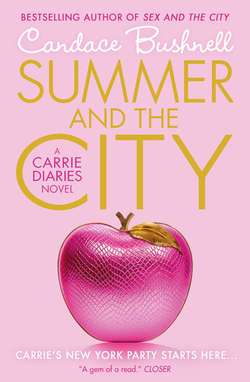Читать книгу Summer and the City - Candace Bushnell, Кэндес Бушнелл - Страница 14
ОглавлениеChapter Nine
“All men are a disappointment. No matter what anyone says.” Miranda Hobbes glares at the cover of Cosmopolitan. “‘How to Get Him and Keep Him,’” she says, reading the cover line aloud in disgust.
She places the magazine back in the rack. “Even if you could get Him—and why do they always capitalize His name like He’s God—I can personally guarantee He wouldn’t be worth keeping.”
“What about Paul Newman?” I count out four dollars and hand the money to the cashier. “I’m sure he’s worth keeping. Joanne Woodward thinks so.”
“First of all, no one knows what goes on between two people in a marriage. And secondly, he’s an actor. Which means by definition he’s a narcissist.” She looks at the package of chicken thighs doubtfully. “Are you sure you know what you’re doing?”
I put the chicken thighs, rice, and the tomato into a bag, feigning ignorance about her concerns. Truth is, I’m a little worried about the chicken myself. Besides being minuscule, the supermarket is none too clean. Maybe that’s why no one cooks in New York. “Don’t you think everyone’s a narcissist?” I ask. “I have this theory that all anyone ever really thinks about is themself. It’s human nature.”
“Is this human nature?” Miranda demands, still absorbed by the rack of magazines. “‘How to De-dimple Your Thighs in Thirty Days.’ ‘Kissable Lips.’ ‘How to Tell What He’s Really Thinking.’ I can tell you what he’s really thinking. Nothing.”
I laugh, partly because she’s probably right, and partly because I’m in the giddy throes of a new friendship.
It’s my second Saturday in New York, and what no one tells you is how the city empties out on the weekends. Samantha goes to the Hamptons with Charlie, and even L’il said she was going to the Adirondacks. I told myself I didn’t mind. I’d had enough excitement for the week, and besides, I had to write.
And I did work, for a few hours, anyway. Then I started to feel lonely. I decided there must be a particular kind of lonely in New York, because once you start thinking about all the millions of people out there eating or shopping or going to movies or museums with friends, it’s pretty depressing not to be one of them.
I tried calling Maggie, who’s spending the summer in South Carolina, but her sister said she was at the beach. Then I tried Walt. He was in Provincetown. I even called my father. But all he said was how much I must be looking forward to Brown in the fall and he’d talk more but he had an appointment.
I wished I could tell him what a hard time I was having with my writing class, but it would have been pointless. He’s never been interested in my writing anyway, convinced it’s a phase I’ll get over when I go to Brown.
Then I looked through Samantha’s closet. I found a pair of neon-blue Fiorucci boots that I particularly coveted, and even tried them on, but they were too big. I also discovered an old leather biker jacket that appeared to be from her former life—whatever that was.
I tried Miranda Hobbes again. I’d actually tried her three times since Thursday, but there was no answer.
But apparently she doesn’t protest on Saturdays, because she picked up the phone on the first ring.
“Hello?” she asked suspiciously.
“Miranda? It’s Carrie Bradshaw.”
“Oh.”
“I was wondering . . . what are you doing right now? Do you want to get a cup of coffee or something?”
“I don’t know.”
“Oh,” I said again, disappointed.
I guess she felt sorry for me, because she asked, “Where do you live?”
“Chelsea?”
“I’m on Bank Street. There’s a coffee shop around the corner. As long as I don’t have to take the subway, I guess I could meet you.”
We spent two hours at the coffee shop, discovering all kinds of things we had in common. Like we both went to our local high schools. And we both loved the book The Consensus as kids. When I told her I knew the author, Mary Gordon Howard, she laughed. “Somehow, I knew you were the type who would.” And over yet another cup of coffee, we began to have that magical, unspoken realization that we were going to be friends.
Then we decided we were hungry, but also admitted we didn’t have any money. Hence my plan to cook us dinner.
“Why do magazines do this to women?” Miranda complains now, glaring at Vogue. “It’s all about creating insecurity. Trying to make women feel like they’re not good enough. And when women don’t feel like they’re good enough, guess what?”
“What?” I ask, picking up the grocery bag.
“Men win. That’s how they keep us down,” she concludes.
“Except the problem with women’s magazines is that they’re written by women,” I point out.
“That only shows you how deep this thing goes. Men have made women coconspirators in their own oppression. I mean, if you spend all your time worrying about leg hair, how can you possibly have time to take over the world?”
I want to point out that shaving your legs takes about five minutes, leaving plenty of time for world-taking-over, but I know she only means it as a rhetorical question.
“Are you sure your roommate won’t mind my coming over?” she asks.
“She’s not really my roommate. She’s engaged. She lives with her boyfriend. She’s in the Hamptons anyway.”
“Lucky you,” Miranda says as we start up the five flights of stairs to the apartment. By the third flight, she’s panting. “How do you do this every day?”
“It’s better than living with Peggy.”
“That Peggy sounds like a nightmare. People like that should be in therapy.”
“She probably is, and it’s not working.”
